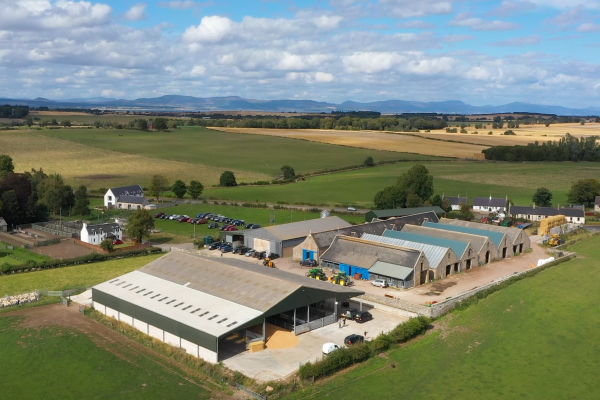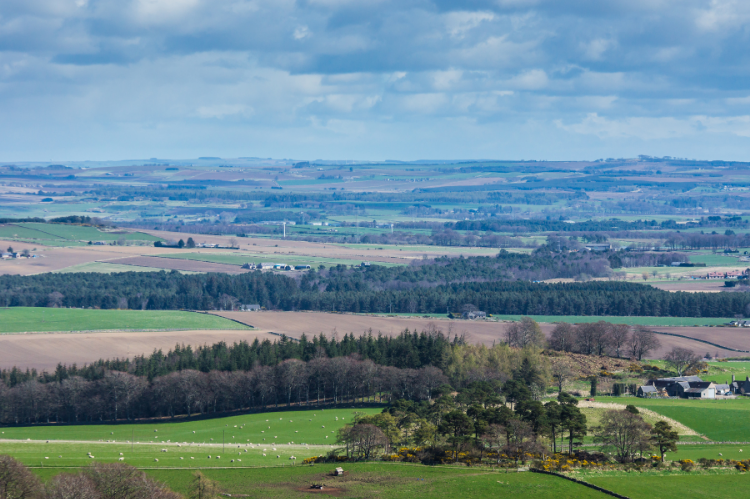Applying for a Farm Tenancy Tender
1 February 2024Entering into a new farm tenancy arrangement is a substantial decision, for both the potential tenant and the landlord, therefore attaining a tenancy often involves preparing a competitive application for a farm. This allows the applicant to explore the opportunities and risks of taking on such a tenancy, but also allows the landlord the prospect of finding their most suitable tenant.
With few farm tenancy opportunities arising in Scotland, each tenancy prospect is usually highly competitive with new and existing farm businesses. This factsheet is designed to help new entrants to agriculture navigate the process of completing a farm tenancy application, which in itself, can be a daunting process from self-reflection, finding a suitable farm tenancy opportunity, completing an application and interview with a landlord.
The Tenant
Initially, before even applying for any farm tenancies it is important to do some self-reflection. In doing so it will help bring some clarity for yourself as to why you want to farm and to identify what knowledge, experience and skills do you already have or need to acquire to be able to take on a farm tenancy. Writing these things down will help to bring focus and also help build a plan to achieve the goal of taking on a suitable farm tenancy.

Funding The Opportunity
Finding a farm tenancy opportunity can be difficult. When farm tenancies are advertised, there is usually a short deadline to submit applications, so it is imperative that you search regularly to be able to catch opportunities as they arise. Often when looking for a farm it is beneficial to be open to moving to seek opportunities that may not be available in your current locality. By limiting yourself to a particular area, it can severely limit the chance of any tenancy openings.
When a tenancy comes onto the open market, it is usually advertised within farming press and on the letting agent’s website and social media outlets. In an attempt to get earlier warning of tenancies coming onto the market, you could contact land agents to register your interest in being notified of any tenancies as they are released.
Being prepared for if/when a tenancy prospect does arise will really help in getting your application pulled together.

The Tender Process
If a tenancy is released requesting a full tenancy tender process, you can expect to follow a similar route as below:
- Request tenancy tender documents from landlord/letting agent
- Visit the farm on any farm tenancy open day, or arrange private viewing
- Build repertoire with landlord/letting agent
- Draw up application documents
- Submit tender documents by the submission deadline
- Landlord/letting agent will look through applications and select a shortlist
- Shortlisted applicants invited for formal interview
- Potentially second interviews
- Landlord/letting agent will make a decision on their preferred tenant and send an official offer letter to confirm their choice
- Tenancy documents will be issued for signing
- Liaise with solicitor to review documents
- Once all signed, then farming can begin on the agreed start date of the tenancy.
Occasionally some tenancies may be on offer under a much simpler tender process, where the price you offer is submitted and decisions made by landlord/letting agent is made thereafter – often in these cases it does help to be known in the locality.
The Farm
Firstly, when a farm tenancy becomes available for tender, you should consider if it is the correct fit for your visions, interests and skillset. Determine the area it is in, what the climate is, land classification, soil types and if it will be a match for your plans. For example if an upland farm came onto the market and you were most interested in growing arable crops, the type of land, soils and climate may not be suited to growing a range of crops and therefore the farm may not be best suited in this instance.
Carefully consider the type of farm tenancy on offer, the length of tenancy, what is included and the terms of the tenancy lease. There are several types of tenancy agreements available in Scotland, these are explained in more detail within the FAS ‘Understanding Agricultural Tenancies for New Entrants’ booklet. The length and terms of a tenancy will have an impact on the suitability and how much you may offer for the land.
It is recommended to arrange to visit and view the farm, prior to submitting your tenancy application. Occasionally an open day may be held at the farm to allow prospective tenants to view the land and buildings ahead of applying. Visiting the farm will allow you to assess the land and/or buildings included, get a feel for the farm and surrounding area and think about what improvements and investments may be required (such as fencing, drainage, property repairs). Use the opportunity to gain as much information as possible about the farm – ask questions and introduce yourself to the letting agent.

If required, you can also request a second viewing once you have had time to think about which potential system you would put in place on the farm. Some find it useful to ask an agricultural consultant to attend the farm viewing with them to keep their mind focussed on the practicalities of running the farm that is on offer.
The Application
The application for a farm tenancy will generally include a business plan, financial budgets and tender application documents. These will take some time to prepare and need to be revisited and tweaked before finally being submitted. Landlords will want to ensure that their assets are in safe hands, they will receive rent payments and not leave tenants in any financial difficulty.
We have a separate factsheet ‘Writing a Farm Tenancy Tender Application’ which can be used as a valuable guide when putting a tenancy tender application together. This document is available here: Writing a Farm Tenancy Tender Application
It is important that you get to know your business plan and financial budgets in detail. When invited for a formal interview you will be asked questions relating to your application documents which the interview panel will have scrutinised in advance, to which you will be expected to explain and justify your reasoning for the fundamental parts of your application. You may wish to consider asking an agricultural consultant for help in drawing together the required tender documents, it is still useful for the applicant to be heavily involved in this process. In some cases, the landlord/letting agent may wish to come and see your current farm, giving you the chance to showcase what you can produce and demonstrate how a new farm tenancy would allow you to grow and progress.

Shortlisting And Final Decision
After the landlord and/or letting agent has had a look through all of the tender applications received, they will generally choose a shortlist of potential tenants. The shortlist is invited for a formal interview, where it gives the landlord/letting agent a change to get to know the potential tenant and to interrogate their business plan and financial figures, giving them an insight into how the potential tenant would run the farm. Prospective tenants are also given the chance to build their vision and inspire the landlord/letting agent to invest in presenting them with the tenancy.
What To Do If You’re Successful
Ultimately, if you are successful the landlord/letting agent will be in contact to issue you with a copy of the farm tenancy agreement for you to sign and return. It is advised that, before signing, you seek legal advice to check that the tenancy agreement contains the expected terms and conditions required for you to run your successful business on the farm.
What To Do If You’re Unsuccessful
Regrettably, if you are unsuccessful in a farm tenancy tender process, the landlord/letting agent will be in touch to notify you of their decision. It will be useful for any future tenancy tender applications to ask for feedback from the letting team so that it can help give you a direction for your next application. Start the process again, look out for another tenancy opportunity, update your business plan and financial budgets and apply for the next prospective farm that resonates with your goals.
Checklist and Links to Further information
Completing a tender application for a farm tenancy can be a long and arduous process. To assist you achieving a strong application, we have created a checklist of useful information below:
- Have you completed some self-reflection? Examples can be found here:
- Have you identified a tenancy opportunity?
- Have you registered with a land agent to express an interest in tenancies in an area? Further information here:
Acquiring Land Through Seasonal Land And Tenancy
- Have you written your business plan? Further information can be found here:
Farm Business Planning: A View from the Bank
- Do you know how you will finance your tenancy? You can find some additional information here:
Webinar: Setting Up A Business And Sourcing Finance
- Have you created your financial budget? Useful information is contained here:
Budgeting and Financial Planning
- Have you undertaken a review of your assets? Assets can include your skills, physical buildings etc.,
Capitalising on Assets Factsheet
- Have you made considerations for building a resilient business?
Farm Resilience - Driving Forward
- Considered drawing up a marketing plan?
Capitalising on Assets - Capitalising on assets Capitalising On Assets Fact Sheet
Additional inspiration can be sought here:
Podcast with Kirsten Williams:
Kirsten Williams: Let your determination grow stronger
New Entrant Tenants Case Studies:
What’s stopping you?:
What's Stopping You? - Barbara Girvan
Samantha Stewart samantha.stewart@sac.co.uk
Sign up to the FAS newsletter
Receive updates on news, events and publications from Scotland’s Farm Advisory Service

